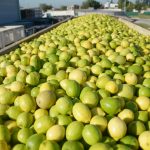Mango farmland triples in Argentina

Argentina is not usually associated with mangoes, but growers in the country's northern province of Jujuy are capitalizing on fast-growing demand. 
In a release, the National Institute of Agricultural Technology (INTA) highlighted the fruit was generating an impact on the regional economy, with the provincial government offering support to promote the tropical fruit in a bid to raise profitability and decrease the market's dependence on imports.
The northeastern part of Argentina is the nation's most logical growing zone for subtropical and tropical fruit due to its geography and climate, offering a production alternative to vegetables and citrus.
"While this is an incipient crop in Jujuy, the surface area for mango cultivation has tripled," said Aldo Arroyo, the INTA director for Yuto, Jujuy.
"Thanks to the Mango Promotion Plan implemented three years ago by the provincial government and the INTA, we have gone from 50 to 150 hectares with a production of 2,250 [metric] tons, in the hands of 200 small growers and also some SMEs.
"Mangoes have enormous consumption potential," he added.
Arroyo said demand was not just for fresh fruit, but also the processing of sweets, juices and ice cream.
"Jujuy has the agronomic capacity to grow the mangoes that are imported today, and in that way cover a commercial niche - up until now met only by Brazil - as well as growing demand."
The INTA said the province had the capacity to harvest mangoes with brix levels greater than 8°, which meant the fruit was sweet and flavorsome. Additionally, the institute said the thermal amplitude between day and night led to a fruit with a greater concentration of soluble solids.
INTA Yuto tropical fruit specialist Carlos Aguirre affirmed that Argentine mangoes were of a better quality than the competition even though they were the same cultivar, Tommy Atkins.










































